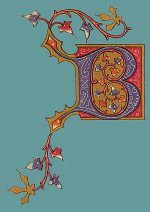
|
AUTHOR INTERVIEW:
Barbara Quick
Author of A GOLDEN WEB
(YA Historical Fiction)
|
|
Barbara Quick's Blog
|
Barbara Quick's
Website
|
|
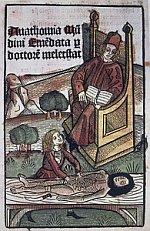
Alessandra Giliani
Italian anatomist, serving as the first woman
prosector, or preparer of dissections for anatomical study
|
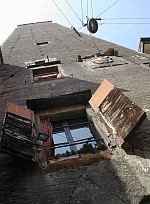
A tower in San
Giovanni in Persiceto, Alessandra Giliani's birthplace
|
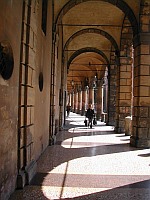
Bologna is
characterized by portici or covered walkways
|
Bologna
University
late 14th century
(Laurentius de Voltolina)
|
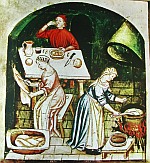
|
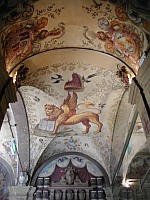
At the Archiginnasio,
one of the magnificent public libraries in Bologna
|
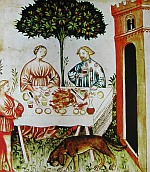
|
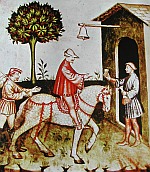
|
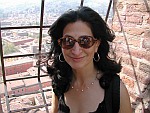
Barbara Quick
at the top of the Asinelli Tower, high above Bologna
|
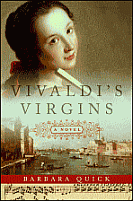
Click bookcover for book trailer for VIVALDI'S VIRGINS
|
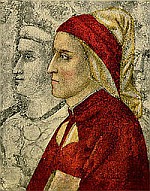
Dante
|
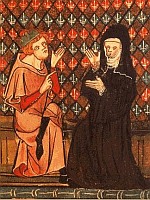
Abelard and Heloise |
|
BOOK
ILLUMINATIONS
|
|
|
Interview:
HISTORICAL FICTION AUTHOR BARBARA QUICK
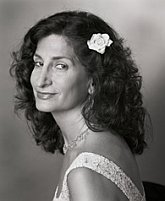
Barbara Quick
|
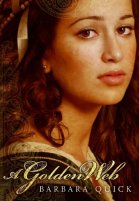
A Golden Web
|
Author Biography:
Award-winning
novelist Barbara Quick learned Italian to do the research for her two
historical novels set in Italy, Vivaldi's Virgins (published in 2007: now translated
into 14 languages) and A Golden Web.
An avid traveler, she spent two different field seasons in arctic
Alaska to research her first novel, the Discover Prize–winning Northern Edge (HarperCollins 1990). She has written
for the New York Times Book
Review, Ms. magazine, the Los Angeles Times, San Francisco
Chronicle, and Newsweek.
Barbara Quick
started her writing life in Southern California, where
she frequently cut school to write poetry and cultivate an organic
vegetable garden. A graduate of the University of California at Santa
Cruz, majoring in English and French, she worked on her pre-first novel
while living in a tower cottage in rural County Cork, Ireland.
Barbara can speak, with varying degrees of proficiency, French,
Italian, German, Brazilian Portuguese, Spanish, and a little
Hungarian. This year, Barbara began studying the viola. Her
motto is, "Better late than never!" Because she loves
flowers and having bouquets around the house, she
tries to keep a picking garden in bloom for as much of the year as
possible. Cooking is also a major enthusiasm. Barbara
specializes in Northern Italian and Southern French cuisine, with an
emphasis on improvisation.
Merri: Barbara, thank you for taking the time
to answer a few questions for readers. I read and loved VIVALDI'S
VIRGINS. I was particularly struck by the poetic use of language
in that novel. As a medieval enthusiast, I secretly hoped you
would choose the Middle Ages as a time period for a novel. I was
thrilled when I discovered that A GOLDEN WEB took place in Medieval
Italy! When I read A GOLDEN WEB, I was struck by how well you
integrated the time period into your novel while still writing a novel
to speak to modern readers. Without further ado, let's begin.
What inspired you to write A GOLDEN WEB?
Barbara Quick:
My last novel gave me the
opportunity to tell the world about a brilliant and talented young
woman who had been, up until the publication of my book, a mere
footnote in obscure musical histories. Researching and writing
VIVALDI'S VIRGINS was such a satisfying experience. Sharing the story
with wonderful readers like you, Merri, has made all the uncertainties
associated with being a writer seem altogether worthwhile--especially
now that the novel has been translated into 14 languages.
When
the book was out of my hands, in production at HarperCollins, I found
myself asking, how many other such 'lost girls' are there, stranded in
the shoals of history and waiting to be rediscovered? I realized that
there must be hundreds--even thousands of them.
I suddenly felt that perhaps I could find and rescue some more of
these lost girls: that I could be a sort of tug-boat that gets them out
into open water, where they can raise their sails and catch the wind.
History has a tradition of
forgetting the brilliant and talented females who lived and worked
contemporaneously with the men whose lives have been so lovingly and
painstakingly chronicled by historians. Really intelligent people have
been all too willing to believe that creative brilliance was, somehow,
the exclusive province of men.
There are even some people today who persist in this belief, almost
as a kind of habit. We look through an encyclopedia and think nothing
of it that there are almost no women there on the pages!
This
gap--this injustice--is what inspired me to plunge into the past again,
to reach my hands out in the darkness, and see who grabbed hold of me.
This time, it was Alessandra Giliani.
Merri:
How did you
discover references to this real historical woman and what made you see
her story needed to be told?
Barbara Quick: There's controversy, in the circle
of academics who study the history of medicine, about whether
Alessandra Giliani actually lived. Was there a real girl, born in the
early 14th century in Persiceto, who made a major anatomical discovery
while working for Mondino de' Liuzzi?
One article I found in Italy suggested that a chronicler working
for wealthy patrons in the 18th century made up Alessandra's story as a
way to flatter the locals in the place where she is said to have been
born and raised, San Giovanni in Persiceto.
The author of the article suggested that this chronicler "borrowed"
the story of an 18th century female anatomist who lived in Bologna
(even though the story of that anatomist is quite different from
Alessandra's story). He poo-pooed the idea that manuscript
illuminations depict Alessandra, or any girl, assisting Mondino. Men
wore their hair long back then, he insisted.
But those illuminations show not just the hair but also the face
and body of a young female working as Mondino de' Liuzzi's
prosector--at least it seems so to me!
I wasn't able to find any
reference to Alessandra in the 14th century archives I consulted. But
the head librarian in Persiceto, a distinguished scholar herself, told
me that what Alessandra did was such an affront to the social mores of
the time that all records of her--and even her family--could have well
been destroyed by the Church.
To me, this mystery makes the story
even more intriguing.
While
I was doing my research and writing the novel, I never for a moment
thought that Alessandra might be anything other than a real girl. She
felt real in the same way that Anna Maria dal Violin seemed utterly
real to me while I was writing VIVALDI'S VIRGINS.
In both cases,
I learned as much as I could about the history and
culture surrounding their lives. These historical facts provided the
settings for both novels, and dictated both their limits and
possibilities--it's important to me to be historically accurate.
But the stories
themselves--the characters and their interactions,
the words they spoke and the hopes they harbored--all of that came from
another place, a dark, mysterious place, which is both inside and
outside me, in the realm of what I guess is usually called the
collective unconscious.
There
was a mystical component to writing this novel, in that the story
seemed to write itself: it was as if I were remembering the story
rather than creating it. I heard the characters speaking. I felt
Alessandra's spirit. I felt her desire to be known and remembered.
Maybe
in feeling what I felt about Alessandra, I was feeling something that
is true--and has been true throughout history--for all the girls and
women in the world whose work and thoughts, ambitions and passions have
been deemed to have no lasting value.
Merri: How did you
research your characters?
Barbara Quick: I went to Bologna to begin my
research while my book contract was still being drafted at
HarperCollins. I spent three weeks there--and one of the most startling
discoveries I made, right off the bat, was how very long ago the 1300s
were! Mostly, they've been all covered up by subsequent eras of
history. The architecture is mostly gone, even in the historical center
of Bologna, covered up by the Renaissance and Baroque periods. I had to
go underground--literally, in crypts and sewers--to look at whatever
traces of the 14th century are still extant.
Merri: What discoveries did you
make? How did the research affect you?
Barbara Quick: I
felt like I was on a solitary
treasure hunt, the entire time I was in Bologna. I walked for hours and
hours every day on those cobbled streets and even along a pilgrimage
road. When I had too many blisters to walk any more, I borrowed a
bicycle from the sweet little hotel where I stayed--the Hotel Porta San
Mamolo--and rode it everywhere, without a helmet, I'm afraid. Greater
Bologna is an intensely urban environment, with buses and motorcycles,
where, back home, I never would have thought about riding a bike. But I
was on a mission--and I had blisters! When I wasn't searching for some
archive, plaque, or painting, I was in the pharmacies, looking for a
better blister remedy!
The
people who owned the hotel were so sweet to me! I'd return to my room
exhausted after a long day of research in various archives and museums
from one end of the town to the other. There would be a knock at the
door--and there was a little boy, sent up by the concierge with a tray
of tea and biscuits for me, and a vase of flowers from the hotel's
garden. Roberto Condello, the owner of the hotel, would proudly
introduce me to other guests as "Barbara Quick, our American writer."
Bologna
was a far cry from Venice, where I really didn't make any friends, even
though the director of the Vivaldi Institute was very nice to me. In
Bologna I was befriended by several people who were unbelievably kind
and helpful. It's a much friendlier city, in general, than Venice,
where the locals have been pretty jaded by all the tourism, for
hundreds of years.
For whatever reason, there isn't that much tourism in Bologna--even
though the food there is spectacularly delicious, and the historical
city center has a great deal of charm. I would go back in a heartbeat!
Merri:
Alessandra
Giliani
lived in Medieval times, times quite different from our own and yet
times when individuals faced similar challenges. What
similarities do
you see facing young adults today?
Barbara Quick: As the mother of a teenager, I can
say with some authority that hormones are hormones--and being a
teenager (or the parent of a teenager!) is a difficult thing, in any
century. Parents have certain expectations--and young people have their
own ideas (and are convinced--as I was, when I was that age--that their
ideas are far more brilliant and original than those of their elders).
I
was struck by the similarities between the advent of our own
Information Age, brought into being by the Internet, and the sudden,
radical need for books that was brought about by the advent of Europe's
first universities--among them, the University of Bologna. Books were
rare, precious things before that time. Unless you were very rich, if
you wanted to learn something, you had to memorize it! People were much
better at memorizing back then than we are...
The printing
press had not yet been invented. But all these students and their
professors needed books!
The
University of Bologna in the early 1300s was quite a radical place,
even more radical than UC Berkeley in the 1960s. It was run by the
students, who hired and fired their professors and made a lot of the
rules--and rebelled when they didn't like the rules.
It
wasn't at all that much of a stretch to imagine Alessandra's
predicament, wanting to be part of this radical world--and yet being
banned from it, by virtue of her gender.
There
are so many things that are equally unreasonable in our own time.
Society has such confused--and confusing--attitudes about girls and
sexuality, for instance. Look at the magazine ads, and the way young
girls are depicted there, and you get one message. But then listen to
what parents and teachers and psychologists are saying, and you get a
very different message indeed!
Alessandra
had the same problem: she knew certain truths about herself--but
society refused to acknowledge them. She was brilliant and wanted to
study. Society had its own ideas. Like the French say, "Plus ca change,
plus ca ne change pas!"
Merri:
How does her story
speak to adult readers?
Barbara Quick: I didn't dumb anything down when I
wrote A GOLDEN WEB, even though I knew it was to be published as a
young adult novel. Really, I wrote just the sort of novel I like to
read. Well, I always try to do that--because I don't think it's honest,
artistically, to try to write for a particular audience. In the final
rewrite, my editor, Rosemary Brosnan, encouraged me to put in a bit
more romance for Alessandra--which I happily did. I wanted her life to
be just as full and exciting and satisfying as possible, considering
the historical circumstances.
As
I know you know, as a Medieval expert, people lived very intensely back
then. Their lives were much shorter, in general, than ours--but they
lived them very fully, with great gusto and passion (especially in
Italy!). They laughed and cried and loved with a grandeur and honesty
that I think modern readers, whether adults or teenagers, can only
admire.
The world was completely alive for them, too. Angels and demons
were real for them, found everywhere. Magic and miracles were part of
everyone's reality--respected, hoped for, and feared. Maybe it's those
rich primary colors one sees in the illuminated manuscripts of the
time--but I can't help feeling that the air was somehow clearer and the
world was more brilliant and gorgeous than the world we live in today.
Merri: How does
historical fiction speak to readers as compared to history?
Barbara Quick: Well, that's an easy one. History
is, for most people, rather difficult to read. Historical fiction, if
it's done well, is simply a pleasure. Instead of learning a lot of dry
facts and dates, you get plunked down into a fully imagined world,
where you learn by simply looking around you and listening and becoming
involved in the lives and thoughts of people who seem completely real.
It's the nearest thing we have to time travel (both for readers and
writers!).
Merri: Barbara, I felt like I had been
transported right into Medieval
Italy when I read Alessandra's story. I too enjoy
historical fiction because it brings a period and especially the people
alive. Thank you for agreeing to the internview and sharing with
with your readers.
Interview:
Copyright Barbara Quick and Book Illuminations, Jan. 2010.
All rights reserved.
Book clubs,
libraries and other reading groups are free to use this
interview as a supplement free of charge. Book Illuminations
would appreciate credit through use of a source citation.
|
|
|